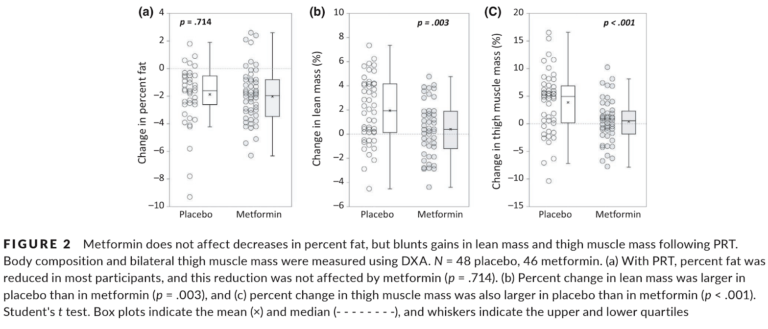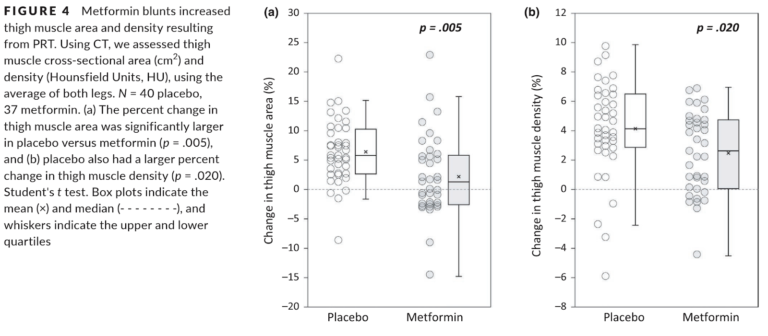Increased muscle mass is associated with improved health outcomes in elderly populations, including decreased disability and increased mobility (1). Resistance training is known to be the most effective therapy for increasing and maintaining muscle mass in the elderly (2). This trial tested the effects of metformin alongside resistance training on muscle growth (hypertrophy) and strength in elderly subjects.
The trial placed 104 elderly men and women on a 14-week resistance training program (the details of the program were not specified). Half the subjects received 1,700 mg per day of metformin alongside their training, while the other half received placebo.
Both groups lost similar amounts of fat. Fasting glucose decreased significantly in subjects on placebo; subjects on metformin displayed a non-significant decrease.
The group taking placebo, as expected, showed increases in lean mass (1.95%), thigh muscle mass (3.9%), and various measures of strength. In the group taking metformin, these benefits were severely attenuated and in some cases nearly eliminated. Metformin users showed virtually zero increase in lean mass (0.41%) or thigh muscle mass (0.45%) and showed strength gains around half of that seen in users taking placebo. As the figures below show, there was significant variability across subjects, but the relative distributions clearly indicate more consistent and larger gains in muscle mass and size in subjects taking placebo than those taking metformin.

 These results are consistent with previous research suggesting metformin suppresses the benefits of resistance training in multiple populations (3). Metformin improves glycemic control by suppressing hepatic glucose output. It also affects the function of metabolic pathways linked to AMPK and mTOR. This study indicates some combination of these effects reduces the impact of resistance training on muscle strength and size in the elderly — the smaller change in fasting glucose seen in subjects taking metformin suggests (as explored previously on CrossFit.com in “Impact of Metformin” and “Metformin Inhibits Mitochondrial Adaptations”) the benefits of exercise on glycemic control may also be suppressed.
These results are consistent with previous research suggesting metformin suppresses the benefits of resistance training in multiple populations (3). Metformin improves glycemic control by suppressing hepatic glucose output. It also affects the function of metabolic pathways linked to AMPK and mTOR. This study indicates some combination of these effects reduces the impact of resistance training on muscle strength and size in the elderly — the smaller change in fasting glucose seen in subjects taking metformin suggests (as explored previously on CrossFit.com in “Impact of Metformin” and “Metformin Inhibits Mitochondrial Adaptations”) the benefits of exercise on glycemic control may also be suppressed.
These risks may provide an argument for not prescribing metformin to elderly patients. In patients who do not require immediate improvements in glycemic control, metformin’s suppression of exercise-induced muscle strength and size gains could increase risk of disability and mortality. In diabetic and prediabetic patients, it is worth considering non-pharmaceutical treatments that lead to improved glycemic control without reducing the benefits of exercise (4).
Comments on Metformin Blunts Muscle Hypertrophy in Response to Progressive Resistance Exercise Training in Older Adults
Let's see, blunts decrease in fasting blood glucose from fat loss secondary to resistance training and blunts muscle hypertrophy from resistance training. More reasons, in the long list of reasons, not to take metformin.
Metformin Blunts Muscle Hypertrophy in Response to Progressive Resistance Exercise Training in Older Adults
2